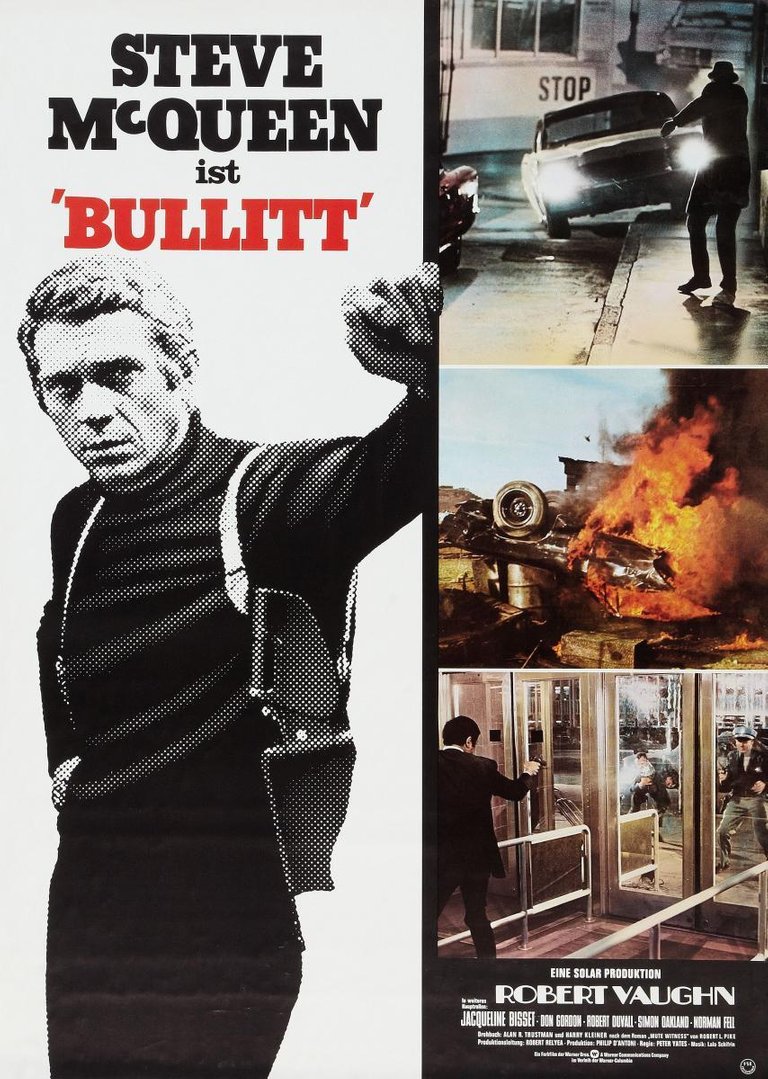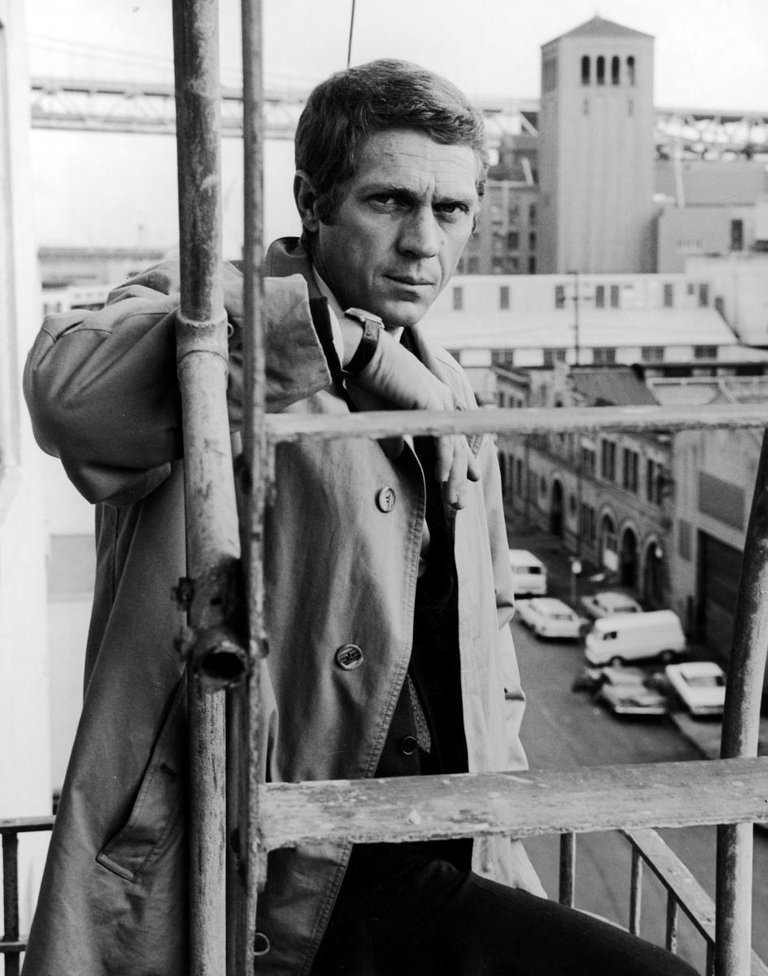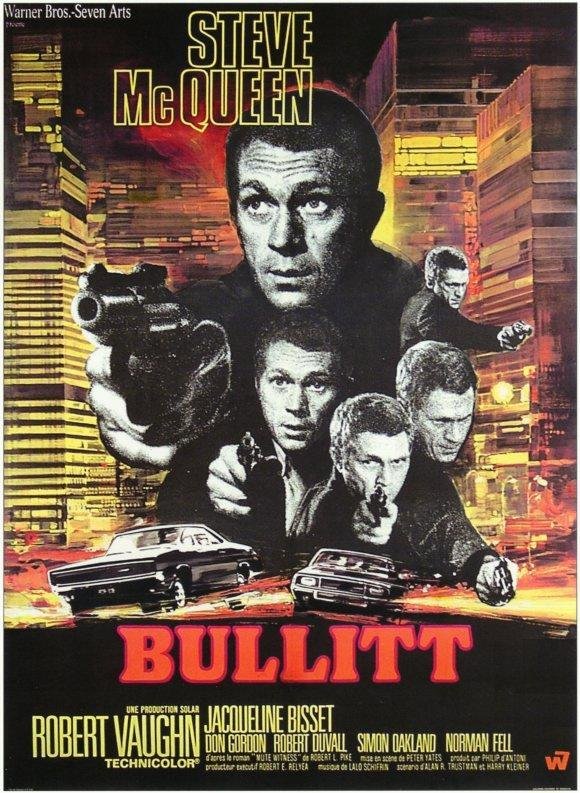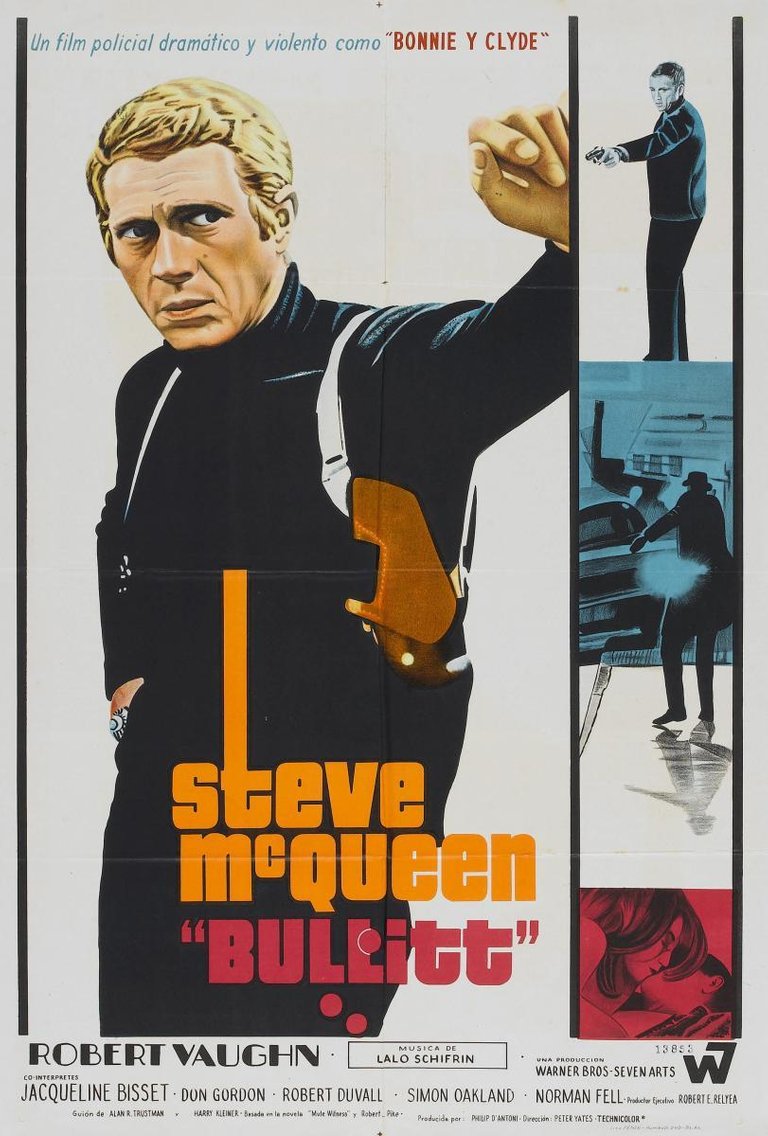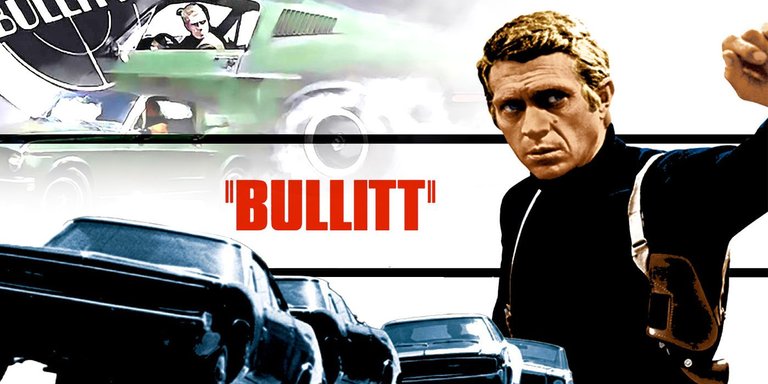
Uno de sus papeles más memorables
A few weeks ago I commented on this platform that I had read the book Cinema Speculations, Quentin Tarantino's first non-fiction work. In the book, the Pulp Fiction director mentions the movies that astonished him when he started going to the movies in the late 1960s and develops an analysis of some of those titles. For a better experience, I accompanied that reading with the movies, most of which I had not seen.
Hace algunas semanas comenté por esta plataforma que leí el libro Meditaciones de cine, la primera obra de no ficción de Quentin Tarantino. En el libro, el director de Pulp Fiction menciona las películas que lo asombraron a él cuando comenzó a ir al cine a finales de los años sesenta y desarrolla el análisis de algunos de esos títulos. Para una mejor experiencia, acompañé esa lectura con las películas, la mayoría de las cuales no había visto.
That was how I found out about the existence of Bullitt a film that very well defines the moment that Hollywood cinema was going through at that time: cowboys were replaced by detectives and lawmen, westerns they would be relegated by police thrillers and the big stars of the moment would embody some of their most famous characters. That was what happened with Clint Eastwood and his Lieutenant Callahan in Dirty Harry and a little earlier with Steve McQueen and his lieutenant Frank Bullitt who also works for the San Francisco police. The plot of Bullitt begins when a political candidate who also has an interest in a high-profile trial entrusts Frank with the protection of a key witness in said trial. The task seems simple, it's just keeping this man safe for about forty hours, from Saturday until Monday morning, so that he can give his statement. Together with two companions, Bullitt is distributed the guards in a small room of a modest hotel to carry out the task. However, in the absence of our protagonist, two armed men break into the hotel and shoot the witness and the guards, who are they? how did they know where it was? It's then that Frank begins a thorough investigation and as the plot progresses, the case becomes more and more complex.
Fue así como me enteré de la existencia de Bullitt una película que define muy bien el momento que el cine de Hollywood atravesaba en ese momento: los cowboys eran reemplazados por los detectives y los hombres de la ley, los westerns serían relegados por los thrillers policíacos y las grandes estrellas del momento encarnarían algunos de sus personajes más célebres. Eso fue lo que ocurrió con Clint Eastwood y su Teniente Callahan en Dirty Harry y un poco antes con Steve McQueen y su teniente Frank Bullitt quien también trabaja en la policía de San Francisco. La trama de Bullitt inicia cuando un candidato político que además tiene interés en un juicio muy sonado le encarga a Frank la protección de un testigo clave en dicho juicio. La tarea parece sencilla, es sólo mantener a salvo a este hombre unas cuarenta horas, desde el sábado hasta la mañana del lunes, para que pueda dar su declaración. Junto a dos compañeros, Bullitt se distribuye las guardias en una pequeña habitación de un modesto hotel para llevar a cabo la tarea. Sin embargo, en ausencia de nuestro protagonista, dos hombres amrmados irrumpen en el hotel y disparan al testigo y a los custodios, ¿quiénes son? ¿cómo supieron en dónde estaba? Es entonces cuando inicia una minuciosa investigación por parte de Frank y a medida que la trama avanza, el caso se vuelve más y más complejo.
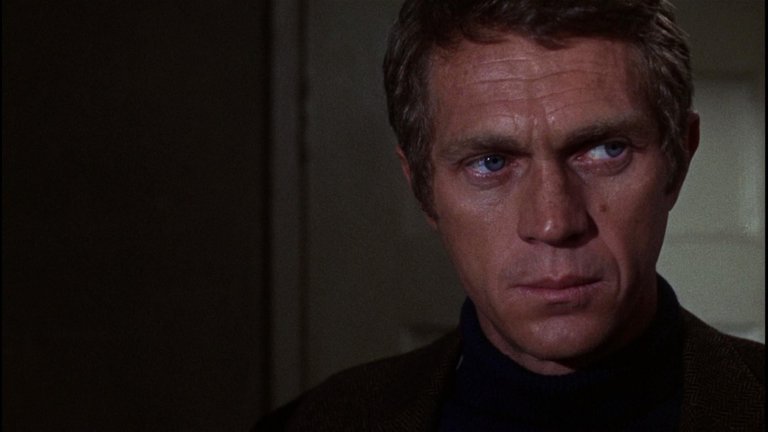
Steve McQueen is one of the great Hollywood stars of the sixties and seventies. Some of his most iconic films were The Magnificent Seven, The Great Escape, Le Mans, The Getaway and Papillon and although he played different roles in them and others (a policeman, an inmate, a cowboy, a race car driver) there are a trait that stands out in several of them and that was part of McQueen's hallmark.
Steve McQueen es una de las grandes estrellas de Hollywood de los años sesenta y setenta. Algunas de sus pelíçulas más icónicas fueron The Magnificent Seven, The Great Escape, Le Mans, The Getaway y Papillon y aunque en ellas y en otras encarnó papeles diversos (un policía, un recluso, un vaquero, un piloto de autos de carreras) hay un rasgo que destaca en varios de ellos y que era parte del sello de McQueen.
Clint Eastwood's Lieutenant Harry Callahan is a grumpy, loudmouthed, aggressive, wry cop who doesn't mind breaking the law and rebelling against authority in his quest for justice. He's not a bad guy, but he can't be said to be noble (he's even a fascist and racist). In contrast, Frank Bullitt is noble. He knows that he is one of the few - perhaps the only - uncorrupted police officer in the institution and although he is not praised for that, he also knows that he must stay that way. Bullitt not only fights for the law, he also has a girlfriend who complains about putting himself in danger and at some point accuses him of being insensitive (Bullitt has just seen a dead girl and is not shocked, but that is his day to day) of cold, and leaves him because he cannot promise what he knows he will not keep. That coldness, that apparent insensitivity that the girl demands of him are necessary for Frank to do his job. And most important of all, Bullitt is a guy of few words. Faced with certain claims or reprimands that he receives, with some provocations from some characters, at times when Dirty Harry would say something ingenious and scathing, Frank Bullitt remains silent, does not flinch, does not get upset. He's a guy with nerves of steel.
El teniente Harry Callahan de Clint Eastwood es un policía malhumorado, un bocazas, agresivo, irónico, a quien no le importa salirse de la ley y rebelarse contra la autoridad en su búsqueda de justicia. No es un mal tipo, pero no puede decirse de él que sea noble (incluso es fascista y racista). En contraposición Frank Bullitt sí es noble. Sabe que es uno de los pocos - quizás el único - policía incorrupto de la institución y aunque no le alaban eso, también sabe que debe mantenerse así. Bullitt no sólo lucha de parte de la ley, también tiene una novia que le reclama el ponerse en peligro y que en algún momento lo acusa de insensible (Bullitt acaba de ver a una chica muerta y no se impacta, pero ese es su día a día) de frío, y lo abandona porque él no puede prometerle lo que sabe que no va a cumplir. Esa frialdad, esa insensibilidad aparente que le reclama la chica son necesarias para que Frank haga su trabajo. Y lo más importante de todo, Bullitt es un tipo de pocas palabras. Ante ciertos reclamos o reprimendas que recibe, ante algunas provocaciones de algunos personajes, en los momentos en que Harry el Sucio diría algo inegenioso y mordaz, Frank Bullitt guarda silencio, no se inmuta, no se altera. Es un tipo con nervios de acero.
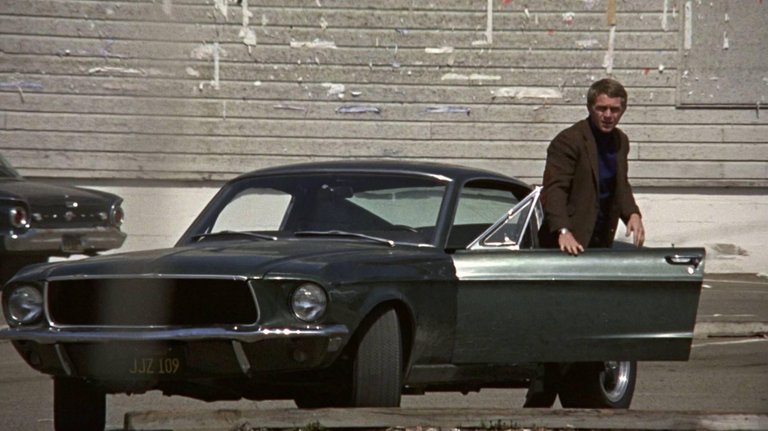
In addition to McQueen's minimalist performance as Bullitt, his coolness and coolness, another of the things that made this movie a box office success, won an Oscar, and was later included in the United States Library of Congress is a car chase that lasts around eleven minutes and is considered one of the best in the history of Hollywood and the best of its time. Aboard a Ford Mustang modified for the film (which even has a much more recent version manufactured by Ford) Frank Bullitt travels the streets of San Francisco chasing those who shot his protected and his companions. The sequence is filmed outdoors, from different angles (it even has shots on board the car) and although it has some minor flaws, it really is one of the most memorable moments in a movie in which there isn't much plot, but good direction, great outdoor scenes and a sober performance from a cool lead.
Además de la actuación minimalista de McQueen como Bullitt, su frialdad y su serenidad, otra de las cosas que hizo que esta película fuera un éxito de taquilla, ganara un Oscar y luego fuera incluida en la Biblioteca del Congreso de los Estados Unidos es una persecución en autos que dura alrededor de once minutos y que está considerada una de las mejores en la historia de Hollywood y la mejor de su época. A bordo de un Ford Mustang modificado para la película (que incluso tiene una versión mucho más reciente fabricada por Ford) Frank Bullitt recorre las calles de San Francisco persiguiendo a quienes dispararon contra su protegido y sus compañeros. La secuencia está filmada en exteriores, desde diferentes ángulos (incluso tiene tomas a bordo del auto) y aunque tiene algunas fallas mínimas, de verdad es uno de los momentos más memorables de una película en la que no hay mucha trama, pero sí buena dirección, grandes escenas en exteriores y una actuación sobria de un protagonista cool.
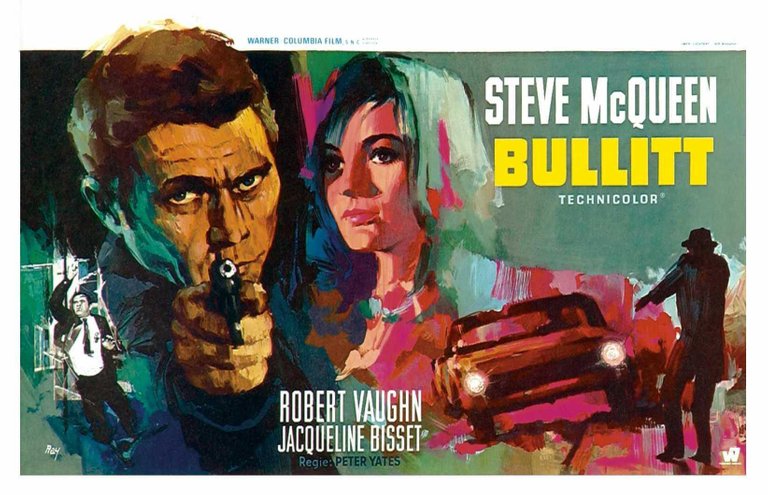
Bullitt was directed by Peter Yates, produced by Philip D'Antoni from a screenplay by Alan R. Trustman and Harry Kleiner and is based on Mute Witness, a novel by Robert L. Fish. In his book, Tarantino tells that Neile McQueen, Steve's wife, played a key role in the roles that her husband played. In fact, of the dozens of scripts that were sent to Steve, she shortlisted the ones that she felt might be good for him (he didn't read the ones she rejected) and had an important role in the fact that Steve McQueen played Frank Bullitt. I know that many of you have seen some of the Dirty Harry movies and that you are fans of police movies, but I don't know if you have seen Bullitt because the truth is that I did not know about this story until I read Quentin Tarantino's book, did any of you already know it? have you seen it? I read you in the comments.
Bullitt fue dirigida por Peter Yates, producida por Philip D'Antoni y el guión de Alan R. Trustman y Harry Kleiner está basado en Mute Witness, una novela de de Robert L. Fish. En su libro, Tarantino cuenta que Neile McQueen, la esposa de Steve, jugaba un papel clave en los papeles que interpretaba su marido. De hecho, de las decenas de guiones que le enviaban a Steve, ella pre seleccionaba aquellos que sentía que podían ser buenos para él (él no leía los que ella rechazaba) y tuvo una intervención importante en el hecho de que Steve McQueen encarnara a Frank Bullitt. Sé que muchos de ustedes han visto alguna de las películas de Dirty Harry y que son aficionados a las películas policiales, pero no sé si habrán visto Bullitt porque la verdad es que yo no sabía de esta historia hasta que leí el libro de Quentin Tarantino, ¿alguno de ustedes ya la conocía? ¿la han visto? Los leo en los comentarios.
Reviewed by | Reseñado por @cristiancaicedo
Other posts that may interest you | Otros posts que pueden interesarte:
 |
|---|
